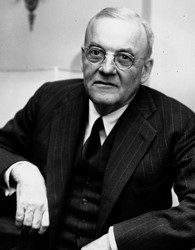John Foster Dulles was hailed as a “master craftsman” of foreign policy. Decades before his work as secretary of state under President Dwight Eisenhower, Dulles was an influential policymaker: In 1919 he was general counsel during the Treaty of Versailles, and in 1949 he traveled to Japan to broker a peace treaty.
John Foster Dulles’ Early Days
John Foster Dulles was born on February 25, 1888, the son of a Presbyterian minister. Dulles came from a long line of Washington insiders: His grandfather, John Watson Foster, had been secretary of state under President Benjamin Harrison and his uncle, Robert Lansing, was secretary of state in the Cabinet of President Woodrow Wilson.
Dulles attended Princeton University, studied at the Sorbonne in Paris and later attended law school at George Washington University. In 1911, he was admitted to the New York bar and joined the New York law firm of Sullivan & Cromwell to specialize in international law.
Dulles’ career in foreign policy began in 1918 when President Wilson appointed him as legal counsel to the United States delegation during the Versailles Peace Conference. Following the conference in 1919, Dulles served as a member of the War Reparations Committee.
After his successful diplomatic excursion, Dulles became a partner at Sullivan & Cromwell and spent much of his career traveling in Europe on international assignments for the firm. His wife, Janet Avery Dulles, often accompanied him.
Sources in this Story
- Arlington National Cemetery Website: John Foster Dulles
- The University of Virginia, Miller Center of Public Affairs: John Foster Dulles (1953-1959): Secretary of State
- Time: I, John Foster Dulles
- Princeton University, Seeley G. Mudd Manuscript Library: John Foster Dulles Collections at Princeton University
Notable Accomplishments
During his years at Sullivan & Cromwell, Dulles developed a relationship with the talented prosecutor and budding Republican politician Thomas E. Dewey. In 1944, when Dewey became the party’s nominee in the presidential election, Dulles worked as the candidate’s foreign policy advisor.
Although Dewey lost to Democratic rival Harry Truman, Dulles’ foreign policy career blossomed. In 1945 he attended the San Francisco Conference, where he helped draft the United Nations Charter. His participation in the conference solidified his stature in the world of international affairs.
During the years that followed, Dulles served as United States delegate to the United Nations. In 1948 President Truman named Dulles acting chairman of the delegation to the U.N. General Assembly in Paris, when Secretary of State George C. Marshall unexpectedly had to return to the United States for surgery.
In July of 1949, Dulles’ longtime friend, Governor Thomas Dewey, named him interim U.S. senator for New York when Senator Robert F. Wagner resigned. Dulles was defeated in a special election in November, though his political career was not yet over.
In 1950 Dulles wrote the book “War or Peace,” which outlined his positions on U.S. foreign policy. The following year, Truman sent him to Japan on a special mission, which would yield a monumental outcome for the diplomacy of both countries.
After removing General of the Army Douglas MacArthur from his Far East commands during fighting in Korea, Truman sent Dulles to Tokyo to assure the Japanese government that MacArthur’s departure would not be accompanied by major changes to U.S. policy in the region. A year later, on September 8, 1951, a peace treaty was signed between the two nations in San Francisco and Dulles was hailed as a “master craftsman” by the State Department.
When Eisenhower was elected in 1953, Dulles was named secretary of state. During his career with the Eisenhower administration, Dulles helped establish the Southeast Asia Treaty Organization (SEATO) in 1954, which called for “collective action” by Asian and Western allies against communism.
During his tenure, Dulles also espoused his philosophy of “brinkmanship” in an article for Life Magazine: “The ability to get to the verge without getting into the war is the necessary art.”
Other notable foreign policy achievements include Dulles’ contributions to the Austrian Peace Treaty, the Formosa Declaration of 1955 and the “Eisenhower Doctrine,” intended to prevent the spread of communism in the Middle East.
The Man and His Work
- “The Truth Is Our Weapon: The Rhetorical Diplomacy of Dwight D. Eisenhower And John Foster Dulles” by Chris Tudda
- “John Foster Dulles and the Diplomacy of the Cold War” by Princeton University Press
- “The Wise Men: Six Friends and the World They Made” by Walter Isaacson, Evan Thomas
The Rest of the Story
Battling cancer, John Foster Dulles resigned from his position as Secretary of State on April 15, 1959. He was awarded the Medal of Freedom and soon after, died from cancer on May 24, 1959.
When Dulles died, his estate was split among his family, law partners and alma mater. Princeton University received all of Dulles’ personal papers, as well as $10,000 to be used toward the John Foster Dulles Library of Diplomatic History.
Princeton’s current collection includes “memoranda of conversations, personal notes and records, drafts of speeches and articles, newspaper clippings, photographs, mementos and memorabilia, and letters from and to Janet Avery Dulles (Mrs. John Foster Dulles),” according to the university web site.
The collection also includes microfilm, an oral history collection on Dulles and papers from the Eisenhower library and Centennial Conference, a symposium on foreign affairs held at the university in 1988 in honor of Dulles.
This article was originally written by Isabel Cowles; it was updated January 10, 2017.











